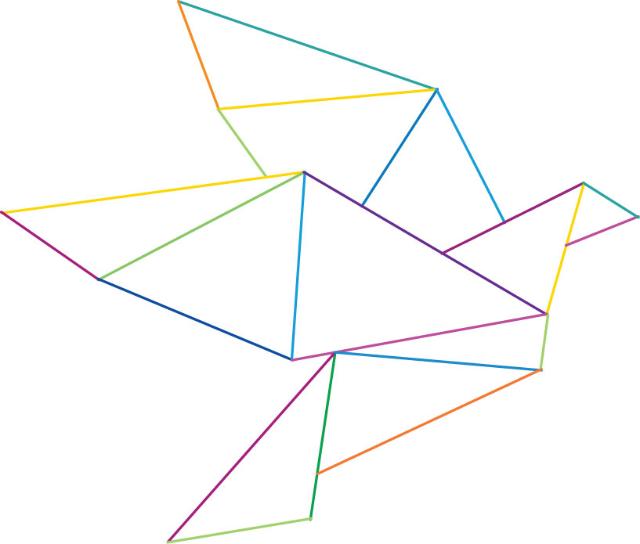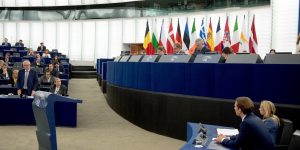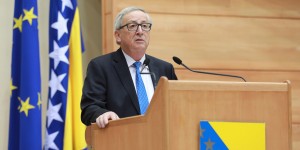Brussels, 14 September 2017
State of the Union 2017 – Trade Package: European Commission proposes framework for screening of foreign direct investments

On 13 September, in his annual State of the Union address, President Jean-Claude Juncker stated: “Let me say once and for all: we are not naïve free traders. Europe must always defend its strategic interests. This is why today we are proposing a new EU framework for investment screening. If a foreign, state-owned, company wants to purchase a European harbour, part of our energy infrastructure or a defence technology firm, this should only happen in transparency, with scrutiny and debate. It is a political responsibility to know what is going on in our own backyard so that we can protect our collective security if needed.”
The European Commission unveiled proposals today to set up a European framework for screening foreign direct investment into the European Union. In parallel, the Commission will start a detailed analysis of the foreign direct investment flows into the EU and set up a coordination group with Member States to help identify joint strategic concerns and solutions in the area of foreign direct investment.
Vice-President Jyrki Katainen said: “The EU is and will remain one of the most open investment regimes in the world. Foreign direct investment is an important source of growth, jobs and innovation. However, we cannot turn a blind eye to the fact that in certain cases foreign take-overs can be detrimental to our interests.”
The EU’s Trade Commissioner Cecilia Malmström said:”The aim of what we are proposing is to keep the EU open to foreign investment, with a non-discriminatory, transparent and predictable framework. A European framework for screening foreign direct investments will allow us to respond collectively and defend our European strategic interests when they are at risk.”
The EU has one of the most open investment regimes in the world. Openness to foreign investment is enshrined in EU Treaties. However, in some cases foreign investors might seek to acquire strategic assets that allow them to control or influence European firms whose activities are critical for our security and public order. This includes activities related to the operation or provision of critical technologies, infrastructure, inputs or sensitive information. Acquisitions by foreign state-owned or controlled companies in these strategic areas may allow third countries to use these assets not only to the detriment of the EU’s technological edge, but also to put our security or public order at risk.
The Commission proposes a new legal framework to enable Europe to preserve its essential interests. This includes:
- A European framework for screening of foreign direct investments by Member States on grounds of security or public order, including transparency obligations, the rule of equal treatment among foreign investment of different origin, and the obligation to ensure adequate redress possibilities with regard to decisions adopted under these review mechanisms.
- A cooperation mechanism between Member States and the Commission. The mechanism can be activated when a specific foreign investment in one or several Member States may affect the security or public order of another.
- European Commission screening on grounds of security or public order for cases in which foreign direct investment in Member States may affect projects or programmes of Union interest. This includes projects and programmes in the areas of research (Horizon 2020), space (Galileo), transport (Trans-European Networks for Transport, TEN-T), energy (TEN-E) and telecommunications.
The new EU-level investment screening framework will ensure transparency and predictability for investors and national governments. It will build on the national review mechanisms already in place in 12 Member States[1] and will not affect EU countries’ ability to adopt any new review mechanisms or to remain without such national mechanisms. When it comes to decisions on foreign direct investments, the European framework will maintain the necessary national flexibility. Member States keep the last word in any investment screening.
The proposed Regulation on screening of foreign direct investments into the EU needs the approval of the European Parliament and EU Member States in the Council (ordinary legislative procedure). In order not to lose any time, the European Commission therefore proposes in parallel to immediately proceed with two additional measures.
First, the Commission will set up a coordination group on inward foreign direct investment that will cover all issues under the scope of the proposed screening Regulation, but will also be a forum for wider discussions. Its broad remit will include identifying sectors and assets that have strategic implications from a security, public order and/or control of critical assets point of view at national level, cross-border level or at European level. The group will be chaired by the Commission and composed of representatives of all Member States.
The group will exchange information and best practices, and analysis on foreign direct investments. It will discuss issues of common concern, such as subsidies and other practices by third countries facilitating strategic acquisitions.
Second, by the end of 2018, the Commission will carry out an in-depth analysis of foreign direct investment flows into the EU, focusing on strategic sectors (such as energy, space, transport) and assets (key technologies, critical infrastructure, sensitive data) whose control may raise concerns for security, or public order reasons. This is particularly the case when the investor is owned or controlled by a third country or benefits from significant state subsidies. In cooperation with Member States, the Commission will collect detailed data, analyse trends, and assess the impact of investments, including through case studies.
Background
The EU has one of the world’s most open investment regimes, and collectively EU Member States have the fewest restrictions in the world on foreign direct investment (FDI). The OECD expressly acknowledged this in its FDI Regulatory Restrictiveness Index which measures statutory barriers against foreign investment in over 60 countries.
The Commission’s reflection paper of 10 May 2017 on Harnessing Globalisation recognised increasing concerns about foreign investors’ strategic acquisitions of European companies with key technologies. These concerns called into question the capacity of the current regulatory framework to address them.
In June 2017, the European Council welcomed the Commission’s initiative to harness globalisation and specifically to analyse investments from third countries in strategic sectors.
For its part, the European Parliament called on the Commission, together with Member States, “to screen third country foreign direct investments in the EU in strategic industries, infrastructure and key future technologies, or other assets that are important in the interests of security and protection of access to them”.
For More Information
Factsheet presenting the Commission proposal
Communication on Welcoming Foreign Direct Investment While protecting Essential Interests
Commission Reflection Paper on Harnessing Globalisation
[1] Austria, Denmark, Germany, Finland, France, Latvia, Lithuania, Italy, Poland, Portugal, Spain, and the United Kingdom.



